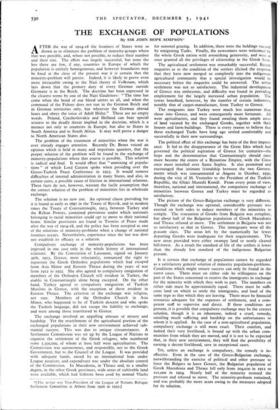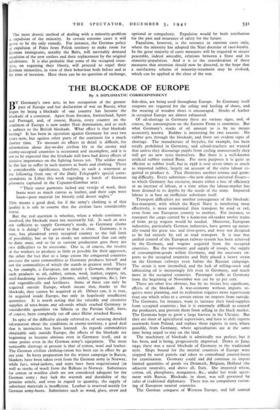THE EXCHANGE
OF POPULATIONS
By SIR JOHN HOPE SIMPSON*
AFTER the war of 1914-18 the frontiers of States were so drawn as to eliminate the problem of minority-groups where that was possible, and, where not possible, to reduce their number and their size. The effort was largely successful, but none the less there are few, if any, countries in Europe of which the population is entirely homogeneous, and however boundaries may be fixed at the close of the present war it is certain that the minority-problem will persist. Indeed, it is likely to prove even more intractable owing to the Nazi theory of Volkstum, which lays down that the primary duty of every German outside .Germany is to the Reich. The doctrine has been expressed in the clearest terms by one of the Nazi Gauleiters : "The time has come when the bond of our blood unites us all, and when the command of the Fiihrer does not run in the German Reich and in German territories only, but wherever the German abroad hears and obeys the voice of Adolf Hitler." These are no empty words. Poland, Czechoslovakia and Holland can bear special witness to the deadly threat implied in the doctrine, which is a menace not only to countries in Europe, but also to States in South America and to South Africa. It may well prove a danger to North American States also.
The problem of the treatment of minorities when the war is over already engages attention. Recently Dr. Benes voiced an opinion which is held in many and important quarters, that the proper solution of the problem will be found in the exchange of minority-populations where that course is possible. This solution is radical and final. It would effect that " unmixing of popula- tions" of which Lord Curzon spoke when presiding over the Greco-Turkish Peace Conference in 1923. It would remove difficulties of internal administration in many States, and also, in certain cases, a possible cause of friction in international relations. These facts do not, however, warrant the facile assumption that the correct solution of the problem of minorities lies in wholesale exchange.
The solution is no new one. An optional clause providing for it is found as early as 1697 in the Treaty of Rysvik, and in modem times the Treaty of Constantinople, 1913, between Turkey and the Balkan Powers, contained provisions under which nationals belonging to racial minorities could opt to move to their national home. Similar provisions are found in Treaties of Peace made after the war of 1914-18, and the policy has been accepted as one of the solutions of minority-problems when a change of national frontiers occurs. Nevertheless, experience since the last war does not establish its efficacy as a solution.
Compulsory exchange of minority-populations has been imposed in one case only in the whole history of international relations. By the Convention of Lausanne, signed on January 30th, 1923, Greece, most reluctantly, renounced the right to repatriate the Greek Orthodox populations which had escaped from Asia Minor and Eastern Thrace during the years of war from 1912 to 1922. She also agreed to compulsory emigration of members of the Orthodox Church still resident in Turkey, the etablis in Constantinople alone being excepted. On the other hand, Turkey agreed to compulsory emigration of Turkish Muslims in Greece, with the exception of those resident in Eastern Thrace. The criterion of the exchange was religion, not race. Members of the Orthodox Church in Asia Minor, who happened to be of Turkish descent and who spoke the Turkish language, did not escape the liability to exchange, and were among those transferred to Greece.
The exchange involved an appalling amount of misery and hardship. Yet the resettlement of the agricultural portion of the exchanged populations in their new environment achieved sub- stantial success. This was due to unique circumstances. A Settlement Commission was set up by the League of Nations to organise the settlement of the Greek refugees, who numbered some 1,300,000, of whom at least half were agriculturists. The Commission was autonomous, and responsible, not to the Greek Government, but to the Council of the League. It was provided with adequate funds, raised by an international loan under League auspices, and expenditure was under the absolute control of the Commission. In Macedonia, in Thrace and, to a smaller degree, in the other Greek provinces, wide areas of cultivable land were available, which had hitherto been used by nomad Vlachs *[The writer was Vice-President of the League of Nations Refugee Settlement Committee at Athens from 1926 to 1930.]
for seasonal grazing. In addition, there were the holdings vacated by emigrating Turks. Finally, the newcomers were welcomed by the whole Greek nation with astonishing generosity, and were at once granted all the privileges of citizenship in the Greek State.
The agricultural settlement was remarkably successful. Recent enquiries as to the condition of the settlers elicited the response that they have now merged so completely into the indigenous agricultural community that a special investigation would he necessary before the enquiries could be answered. The urban settlement was not so satisfactory. The industrial development of Greece was embryonic, and difficulty was found in providing employment for the largely increased urban population. The towns benefited, however, by the transfer of certain industries, notably that of carpet-manufacture, from Turkey to Greece.
The emigrants into Turkey were much less numerous than those into Greece, and were consequently more fortunate. All were agriculturists, and they found awaiting them ample areas of land vacated by the exchanged Greeks, together with their houses and farm-buildings. There is every reason to believe that these exchanged Turks have long ago settled comfortably and successfully in their new surroundings.
The political effect of this exchange has been of the first import- ance. It led to the disappearance of the Great Idea which had governed the political aspiration of Greece for centuries—the hope and the determination that Constantinople should once more become the centre of a Byzantine Empire, with the Cross once more installed over Santa Sophia. It also permitted and encouraged that intimate friendship between the two Govern- ments which was consummated at Angora in October, 1930, during the visit of M. Venizelos to the President of the Turkish Republic, the Ghazi Mustafa Kemil. From every point of view, therefore, national and international, the compulsory exchange of minorities between Greece and Turkey must be regarded as satisfactory.
The picture of the Greco-Bulgarian exchange is very different. Though the exchange was optional, considerable pressure was exerted on both sides to induce members of the minorities to comply. The evacuation of Greeks from Bulgaria was complete, but about half of the Bulgarian population of Greek Macedonia and Thrace refused to move. The settlement in Bulgaria was not so satisfactory as that in Greece. The immigrants were all the peasant class. The areas left by the numerically far fewer departing Greeks were inadequate for their requirements. The new areas provided were either swampy land or newly cleared hill-forest. As a result the standard of life of the settlers is lower than the already low standard of the indigenous Bulgarian peasant.
It is certain that exchange of populations cannot be regarded as a satisfactory general solution of minority population-problems. Conditions which might ensure success can only be found in the rarest cases. There must on either side be willingness on the part of the States concerned to receive the immigrants in exchange for the minority with which they wish to part. The numbers on either side must be approximately equal. There must be suffi- cient land on which to settle the immigrants, and land of the same type as that which they are leaving. There must be financial resources adequate for the expenses of settlement, and a com- petent staff to supervise and direct. If these conditions are present, it is possible that compulsory exchange may be the correct solution, though it is an inhumane, indeed a cruel, remedy, entailing much suffering and hardship on the unfortunates to whom it is applied. In the case of a non-agricultural population, compulsory exchange is still more cruel. Their comfort, and indeed their very livelihood, is bound up with the urban com- munities from which they are moved, and it is not to be expected that, in their new environment, they will find the possibility of earning a decent livelihood, save in exceptional cases.
Yet, unless an exchange is compulsory, the remedy is in- effective. Even in the case of the Greco-Bulgarian exchange, notwithstanding the exercise of political and other pressure to force the Bulgars to leave Greece, the Bulgarian population of Greek Macedonia and Thrace fell only from 204,000 in 1912 to 101,000 in 1924. Nearly half of the minority resisted the pressure and refused to move. The minority-problem remained, and was probably the more acute owing to the measures adopted for its solution. The most drastic method of dealing with a minority-problem is expulsion of the minority. In certain extreme cases it will prove to be the only remedy. For instance, the German policy of expulsion of Poles from Polish territory to make room for German immigrants, notably the Baits, will inevitably demand expulsion of the new settlers and their replacement by the original inhabitants. It is also probable that some of the occupied coun- tries, on regaining their liberty, will proceed to expel their German minorities, in view of their behaviour both before and at the time of invasion. Here there can be no question of exchange, optional or compulsory. Expulsion would be both retribution for the past and insurance of safety for the future.
Expulsion, however, is the resource in extreme cases only, where the minority has adopted the Nazi doctrine of race-loyalty. In the great majority of cases measures will be required to secure peaceable, indeed amicable, relations between a State and its minority-population. And it is to the consideration of these measures that attention should now be directed, in the hope that a satisfactory scheme of minority-treatment may be evolved, which can be applied at the close of the war.























 Previous page
Previous page